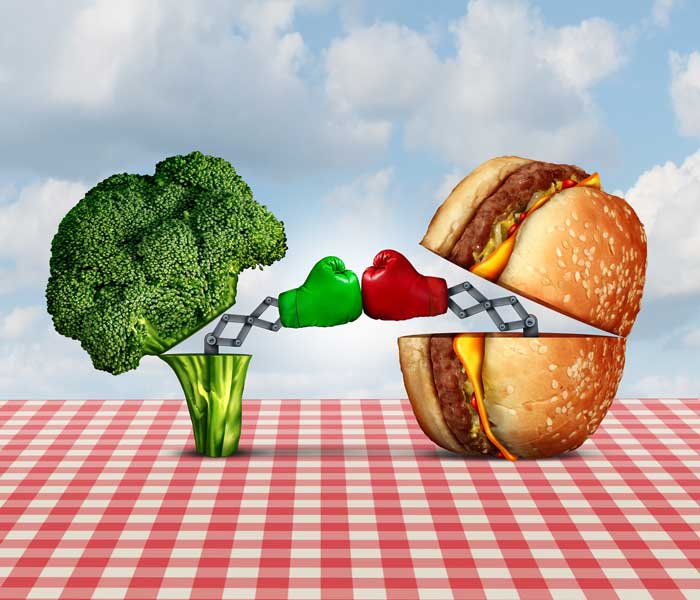Would you agree that eating a healthy diet is important?
Most people would agree that a balanced diet and healthy eating habits are important. But for those recovering from a drug or alcohol addiction, learning and following a healthy nutritional plan is an essential part of their recovery.
The Effect of Diet and Nutrition on Addiction Recovery
In an article written for the University of Kent, titled “Nutrition and Addiction – Can Dietary Changes Assist with Recovery?”, Margherita Grotzkyj-Giorgi, Ph.D., explains that addictive substances such as alcohol, painkillers, heroin, and other drugs “can damage and even shut down the digestive process, preventing the brain from being nourished properly.” The author goes on to explain that a person who follows a healthy nutrition plan and has a “well-nourished brain” generally experiences fewer symptoms of withdrawal during the early phases of recovery and also has a higher possibility of achieving long-term recovery.
When a person abuses drugs or alcohol, it prevents their body from processing two important amino acids, tryptophan and tyrosine, properly. These amino acids produce the compounds serotonin, dopamine, and norepinephrine, which are neurotransmitters in the brain. These compounds are essential for mental clarity, alertness, emotional stability, and the overall feeling of well-being and calmness. When their levels are decreased, a person’s mood and behavior are negatively affected.
Nutrients and the Physical Effects of Substance Abuse on the Body
Many people who suffer from a substance abuse addiction become malnourished. They are deficient in the essential vitamins, minerals, micronutrients, and macronutrients that their body needs to function in a healthy way. This occurs because their body’s cells are not able to produce the proteins they need to absorb the necessary nutrients.
Drug or alcohol abuse that takes place over a long period of time often causes significant damage to the lining of the intestines. When this happens, the body is unable to absorb Vitamin B12 which is needed for the production of red blood cells, DNA, and RNA. Vitamin B12 is also needed for the maintenance of healthy nerve cells.
Several other nutrients that the body cannot absorb include:
- Folate
- Magnesium
- Calcium
- Zinc
Individuals that are deficient in essential nutrients often experience symptoms of anxiety, low energy, and depression. Maintaining proper nutrition is essential to the healing process needed to become and stay sober. Without following a healthy eating plan, many individuals face the possibility of triggering a relapse and begin using drugs or alcohol again.
The Benefits of Following a Healthy Nutritional Plan
When an individual is recovering from a substance abuse problem, eating a healthy diet has numerous benefits. The nutrients that proper nutrition provides supply their body with much needed energy. The person feels better mentally, physically, and emotionally. Their mood is affected in a good way, often giving them a more positive outlook regarding their recovery. In some cases, feeling better and having a positive outlook reduces the risk of having a relapse.
Additional benefits of following a healthy nutritional plan include:
- Strengthening of the immune system
- Rebuilding damaged tissue and organs
- Regaining the proper functioning of various systems in the body, such as the gastrointestinal and nervous systems
Individuals that are addicted to drugs or alcohol have caused a great amount of stress to their bodies and their minds. Following proper nutritional guidelines helps both the brain and the body to heal from the damage of prolonged substance abuse.
Getting Help in Learning How to Follow a Healthy Diet Plan
A report in the Journal of American Dietetic Association stresses the importance of including nutritional education in addiction recovery. The findings of their studies “support the position that nutrition education is an essential component of substance abuse treatment programs and can enhance substance abuse treatment outcomes.”
At The Aviary Recovery Center, learning how to eat a healthy and balanced diet is an essential aspect of the recovery process. Clients learn about proper nutrition, what foods to avoid during recovery, how to make a meal plan that is within their monthly budget, and how to practice healthy nutrition in their daily life. The nutritional guidance, combined with the many additional services provided at The Aviary, which include various types of traditional and holistic therapies, life skills, and family healing, provide residents with the tools they need to live a healthy and sober life.
(314) 464-0222. We’re here to help.










